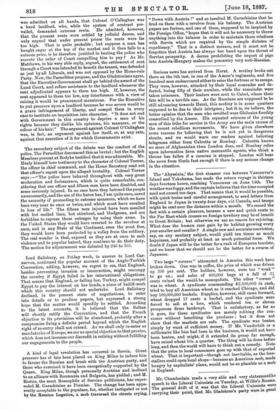Two large " corners " attempted in America this week
have broken down. One was in coffee, the price of which was driven up 300 per cent. The holders, however, were too " weak " to go on ; and sales of 400,000 bags at a fall of 3-1- cents ruined the would-be monopolists. The other " corner " was in wheat. A syndicate commanding £2,500,000 in cash, tried to buy all American wheat as it reached Chicago, and did buy 100,000,000 bushels. Supplies, however, still came forward, wheat dropped 17 cents a bushel, and the syndicate were forced to sell at a loss, which rendered ten or eleven prosperous firms bankrupt. That is satisfactory, as far as it goes, for these syndicates are merely robbing the con- sumer without benefiting the producer ; but it does not show that the markets are safe. The syndicate was beaten simply by want of sufficient money. If Mr. Vanderbilt or a millionaire like him had been in the business, it would not have been beaten, and might, if it extended its grasp far enough, have raised wheat 10s. a quarter. The thing will be done before long, and then the world will have to think out a remedy. Note that the price to local consumers goes up with that of exported wheat. That is important—though not inevitable, as the fore- stallers could open local shops—because an American mob, made hungry by capitalists' plans, would not be so placable as a mob in England.


































 Previous page
Previous page